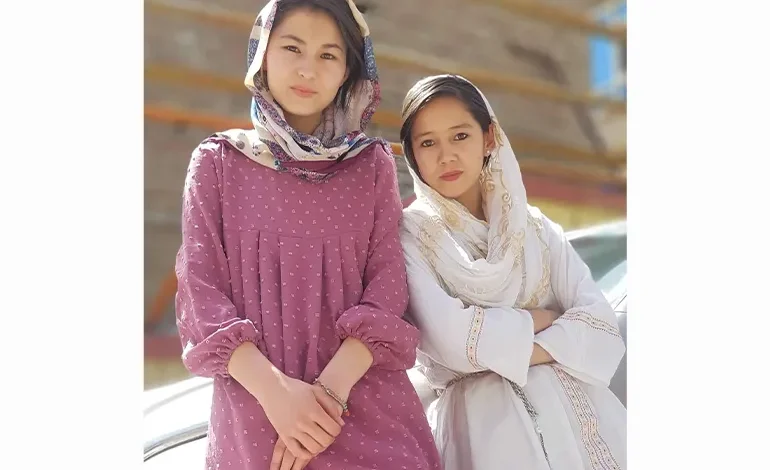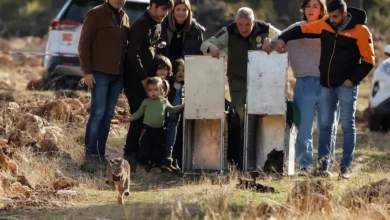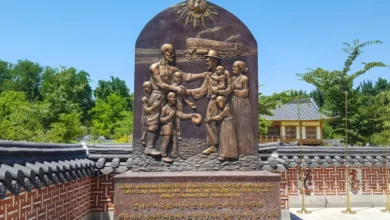‘Books they love’: A Kabul graveyard library for two schoolgirls
Zaid al-Ali

One morning in early October last year, 16-year-old cousins Marzia and Hajar Mohammadi were laid to rest next to one another in a remote graveyard on the outskirts of Kabul. Among the roses on the girls’ graves, their grieving family members placed a few of the teenagers’ favourite books – a tribute to their love of reading.
Marzia and Hajar were among the 53 students killed last September in an attack on a Kaj education centre in Dasht-e-Barchi, a predominantly Shia Muslim and Hazara ethnic minority neighbourhood. A suicide bomber detonated his explosives in a crowded classroom among students who had gathered for a practice university entrance exam. Most of the victims were young women.
While no group has claimed responsibility for the attack, the affiliate of the ISIL (ISIS) armed group in Afghanistan, the Islamic State of Khorasan Province, ISKP (ISIS-K), has targeted places where Hazaras worship, study and work. In April 2022, explosions targeted two educational institutes attended by students in the Dasht-e-Barchi neighbourhood, killing at least six people. The centre where Marzia and Hajar were killed had been attacked before – in 2018, in a blast that killed more than 40 students. ISKP claimed responsibility for that attack.
Since the Taliban takeover in August 2021, ISKP has claimed responsibility for 13 attacks against Hazaras and is linked to at least three others, in which at least 700 people have been killed or injured, according to Human Rights Watch.
A bucket list of dreams
A day after Marzia and Hajar’s funeral, their heartbroken uncle, 42-year-old Zaher Modaqeq, discovered a number of diaries and journals among the girls’ personal effects. Deeply moved by their writing, he shared some pages from Marzia’s diary on social media, including a bucket list of things she wanted to do in life.
“My Marzia and Hajar were such amazing girls, so different than others their age. I wish more people could have known their determination,” Zaher reflected. “They could have inspired many, I believe they still can.”
Although Hajar’s parents did not wish to share their daughter’s writing in public, Zaher says Marzia’s entries provide a glimpse into both their aspirations.
At the very top of their bucket list was meeting their favourite author, Turkish-British novelist Elif Shafak. Other unfilled dreams included visiting the Eiffel Tower in Paris and eating a pizza in Italy. On social media, Zaher posted Marzia’s entry about shopping for books after the Taliban takeover. And he shared how the girls’ siblings left books on Marzia and Hajar’s graves. The posts went viral on social media and touched a nerve in a country which continues to lose its young people to continuing violence.
After Marzia and Hajar’s funeral, their 22 siblings returned regularly to the quiet, dusty, hilltop cemetery. About a week later, they found several books – mostly in Persian, some in English, and all well-worn from years of reading – left behind by strangers.
The following week, there were about two dozen books – titles by Shafak, American author Rachel Hollis and Iraqi Yazidi human rights activist Nadia Murad.
“We always knew Marzia and Hajar really loved books,” explained 21-year-old Insiya, Hajar’s older sister and Marzia’s cousin. But after pages of Marzia’s diary were shared on social media others learned “how much they liked being surrounded by books, and people honoured them with these books”.
Strangers’ books
Pages from Marzia’s diary, daily notes she wrote to herself in neat, legible handwriting in Farsi and occasionally in English, were shared by Zaher with Al Jazeera. More than half a dozen diaries – some battered notebooks, others leather-bound planners – filled with hundreds of entries, reveal a determined young woman who found strength in books amid the attacks on Hazaras, an historically persecuted group, and other Shia Muslim communities, and growing restrictions on women under the ruling Taliban.
Since the Taliban’s return to power, it has shut down girls’ secondary schools, affecting about three million students, restricted women from entering workplaces and imposed other curbs on freedom including requiring a close male relative to accompany any long-distance travel.
On August 23, 2021, about a week after the Taliban’s takeover, Marzia wrote, “Today I stepped out of the house for the first time since the arrival of the Taliban … I had a feeling of insecurity and dread.”
The teenager went to a bookshop and bought The Architect’s Apprentice by Shafak, the author Marzia and Hajar idolised. “Today I realised how much I love books,” she wrote. “I like seeing people’s joy when they see and read books.”
As Marzia and Hajar’s siblings came upon more books left behind by strangers they decided to create a small outdoor library.
One family member brought out an old cupboard that had fallen into disuse. They cleaned and painted it bright orange – the girls’ favourite colour.
Fatema Khairullahi, an Afghan graphic designer, made an illustration of the girls after they had died showing them with a pine tree – a symbol of strength and resilience – and shared it on social media. When the family decided to set up the library they contacted the artist who agreed to recreate the image as a mural in the centre of the cabinet.










